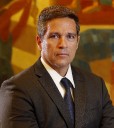|
Location: AV CORE
 |
Alejandro Werner Director Western Hemisphere Department, IMF |
Alejandro Werner assumed his current position as Director of the Western Hemisphere Department of the International Monetary Fund (IMF) in January 2013.
A Mexican citizen, Mr. Werner has had distinguished careers in the public and private sectors as well as in academia. He served as Undersecretary of Finance and Public Credit of Mexico (December 2006–August 2010) and Head of Corporate and Investment Banking at BBVA-Bancomer (August 2011 until end-2012). Previously, he was Director of Economic Studies at the Bank of Mexico and Professor at ITAM, Instituto de Empresa, and Yale University. He has published widely. Mr. Werner was named Young Global Leader by the World Economic Forum in 2007.
Mr. Werner received his Ph.D. from the Massachusetts Institute of Technology in 1994.
 |
Roberto de Oliveira Campos Neto Governor of the Central Bank of Brazil |
Mr. Campos Neto is the Governor of Banco Central do Brasil since February 2019. He has an extensive professional background, after 22 years working in varied roles at financial institutions in Brazil and abroad.
Governor Campos Neto consolidated his career at Santander Bank, where he spent 20 years in various leadership positions. He is an enthusiast of technology and financial innovation. At Santander, he initiated a global project on technology innovation and was part of the Digital Bank ” initiative. He also engaged on studies about blockchain, digital assets, among other innovations that will help shape financial markets in the future. Governor Campos Neto received his Bachelor's and Master's degrees in Economics from UCLA University of California.
Key Points:
Quotes:
“The main lesson from the 2020 crisis is that it is better to err in doing too much than doing too little. We had many programs, but we knew that we would need to do many programs to test the ones that were more efficient.” Roberto de Oliveira Campos Neto
“We launched a wide sustainability agenda in September of 2020, in part recognizing that what the society demands this recovery to be has basically two important dimensions: to be inclusive and to be sustainable.” Roberto de Oliveira Campos Neto
“It was a puzzle of why interest rates were so high in Brazil. It was a structural issue that Brazil has been able to break. Now the interest rates in Brazil came down significantly and the transmission of the monetary policy is much more powerful.” Alejandro Werner
Contributor: Daniela Alcantara